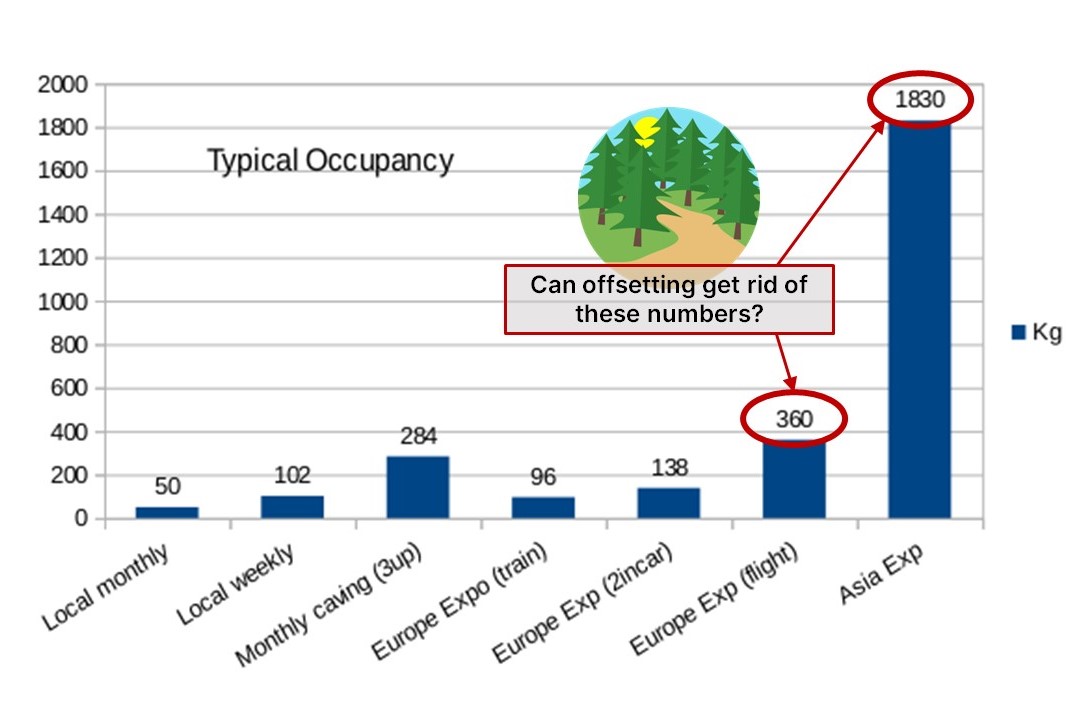I was thinking of the effect of the long distant flights to certain caving expedition areas abroad. Mulu, Mexico, Megahalaya to name a few. Other than not flying so far, or at all, how do you calculate your carbon use and what can you do to offset it? I've seen various companies which charge to offset it for you but that seems a bit, er, like it doesn't really help.
Anyone offer any advice on this subject?
Getting back to the actual question. Having done quite a lot of research on this I would recommend using the Atmosfair calculator:
https://www.atmosfair.de/en/offset/flight/ primarily because it uses the most accurate estimate of actual emissions and climate forcing (which is almost a factor of 3 over the simple CO2 emissions - I'll cover this in another post). And all their offset projects are things that are reasonably convincing and very likely reduce total emissions, and they explicitly exclude tree-planting projects for all the reasons that have been discussed about how they are prone to being a) complete bullshit and b) at risk of just burning up at any moment.
The only offset scheme which _actually_ takes CO2 out of the atmosphere and sequesters carbon, and thus _definitely_ works, is Climeworks, which does Direct air capture and buries the CO2 in the form of carbonate rock in basalt. It's in Iceland. Their system is subscription-based, although I see they are now allowing specific-amount offsets too. The idea is to use it for your life in general, rather than just specific items. It's also 30-100 times more expensive than most other offsetting options at a bit more than £1/Kg, so offsetting one flight to Mulu or a pretty low-carbon life in the UK (3.5 tonnes) would cost you about 4 grand.
https://climeworks.com/
As I explain in the GPF paper, the distribution of offset prices is rather odd. There is Climeworks at ~£1000/tonne, then there is _everything else_ at £5-£40/tonne. There is nothing in between, despite the social cost of carbon being somewhere in the £100/tonne range, and the EU carbon price now being around €90/tonne.
https://ember-climate.org/data/data-tools/carbon-price-viewer/
Atmosfair's price is currently £23/tonne.
One thing I definitely _wouldn't_ use is the little tickbox your airline provides 'offset this flight'. They are likely to be using the lowest possible estimates of emissions (with a climate factor of 1) and the cheapest and potentially useless-est forest-based offsets at laughable prices like £2/tonne. Some airlines (Ryanair, I'm looking at you) I wouldn't trust to not just keep the money and laugh at you for being so gullible.
There are probably other suppliers that are worth using; the market has no doubt moved on in the last 3 years. The above is what I found in 2020, with the prices updated for today. (The EU carbon price has more than doubled since then, Climeworks price has gone up 22%, Atmosfair's price is the same).
You should be aware that one of the biggest difference between suppliers is how they calculate the emissions. It's important to allow for the fact that high-altitude burning significantly increases the warming effect in comparison to just burning some fuel on the ground. The effect is quite variable, depending on weather, route, plane etc. A realistic number is in the 2-3 range, probably nearer 3. Pick an offsetter, or emissions calculator, that has a realistic climate factor (atmosfair for flights). For other travel: trains, cars and coaches calulators still vary a lot. I'd use ecopassenger.org for train or 'average car' numbers.
woodlandcarboncode.org.uk





